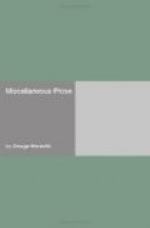and numbers in England, affected by the weapons they
have used to get to their present strength, do think
it; forgetful that our obtuseness to their constant
appeals forced them into the extremer shifts of agitation.
Yet it will hardly be denied that these men love
Ireland; and they have not shown themselves by their
acts to be insane. To suppose them conspiring
for separation indicates a suspicion that they have
neither hearts nor heads. For Ireland, separation
is immediate ruin. It would prove a very short
sail for these conspirators before the ship went down.
The vital necessity of the Union for both, countries,
obviously for the weaker of the two, is known to them;
and unless we resume our exasperation of the wild
fellow the Celt can be made by such a process, we have
not rational grounds for treating him, or treating
with him, as a Bedlamite. He has besides his
passions shrewd sense; and his passions may be rightly
directed by benevolent attraction. This is language
derided by the victorious enemy; it speaks nevertheless
what the world, and even troubled America, thinks
of the Irish Celt. More of it now on our side
of the Channel would be serviceable. The notion
that he hates the English comes of his fevered chafing
against the harness of England, and when subject to
his fevers, he is unrestrained in his cries and deeds.
That pertains to the nature of him. Of course,
if we have no belief in the virtues of friendliness
and confidence—none in regard to the Irishman—we
show him his footing, and we challenge the issue.
For the sole alternative is distinct antagonism,
a form of war. Mr. Gladstone’s Bill has
brought us to that definite line. Ireland having
given her adhesion to it, swearing that she does so
in good faith, and will not accept a smaller quantity,
peace is only to be had by our placing trust in the
Irish; we trust them or we crush them. Intermediate
ways are but the prosecution of our ugly flounderings
in Bogland; and dubious as we see the choice on either
side, a decisive step to right or left will not show
us to the world so bemired, to ourselves so miserably
inefficient, as we appear in this session of a new
Parliament. With his eighty-five, apart from
external operations lawful or not, Mr. Parnell can
act as a sort of lumbricus in the House. Let
journalists watch and chronicle events: if Mr.
Gladstone has humour, they will yet note a peculiar
smile on his closed mouth from time to time when the
alien body within the House, from which, for the sake
of its dignity and ability to conduct its affairs,
he would have relieved it till the day of a warmer
intelligence between Irish and English, paralyzes
our machinery business. An ably-handled coherent
body in the midst of the liquid groups will make it
felt that Ireland is a nation, naturally dependent
though she must be. We have to do with forces
in politics, and the great majority of the Irish Nationalists
in Ireland has made them a force.




